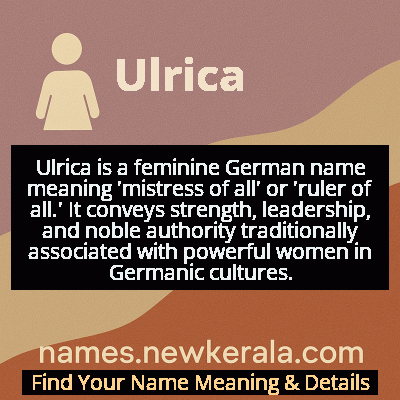Ulrica Name Meaning & Details
Origin, Popularity, Numerology Analysis & Name Meaning of Ulrica
Discover the origin, meaning, and cultural significance of the name ULRICA. Delve into its historical roots and explore the lasting impact it has had on communities and traditions.
Name
Ulrica
Gender
Female
Origin
German
Lucky Number
1
Meaning of the Name - Ulrica
Ulrica is a feminine German name meaning 'mistress of all' or 'ruler of all.' It conveys strength, leadership, and noble authority traditionally associated with powerful women in Germanic cultures.
Ulrica - Complete Numerology Analysis
Your Numerology Number
Based on Pythagorean Numerology System
Ruling Planet
Sun
Positive Nature
Leaders, ambitious, highly driven, self-reliant, innovative.
Negative Traits
Overly aggressive, domineering, impatient, selfish.
Lucky Colours
Red, orange, gold.
Lucky Days
Sunday.
Lucky Stones
Ruby, garnet.
Harmony Numbers
2, 3, 9.
Best Suited Professions
Entrepreneurs, managers, engineers.
What People Like About You
Courage, determination, leadership.
Famous People Named Ulrica
Ulrika Eleonora of Sweden
Queen of Sweden
Ruled as Queen of Sweden from 1718-1720 and played a significant role in Swedish politics
Ulrike Meinhof
Journalist and political activist
Co-founded the Red Army Faction and became a prominent figure in German left-wing radicalism
Ulrika Pasch
Painter
Renowned Swedish rococo painter and one of few female artists recognized in her time
Ulrica Arfvidsson
Fortune teller
Famous Swedish fortune teller who predicted the assassination of King Gustav III
Name Variations & International Equivalents
Click on blue names to explore their detailed meanings. Gray names with will be available soon.
Cultural & Historical Significance
The name's cultural significance extends beyond royalty to encompass broader themes of female empowerment in Germanic societies. During the 18th and 19th centuries, Ulrica became symbolic of educated, upper-class women who were expected to manage households and estates with competence and authority. In literature and folklore, characters named Ulrica often represented strong-willed women who challenged traditional gender roles while maintaining their femininity. The name's persistence in modern times reflects ongoing appreciation for its historical depth and the values of leadership and resilience it embodies.
Extended Personality Analysis
Women named Ulrica are typically perceived as strong-willed, confident, and natural leaders. They often exhibit a commanding presence combined with intellectual depth and strategic thinking. The name's historical association with royalty and power contributes to expectations of dignity, responsibility, and the ability to handle complex situations with grace. Ulricas are frequently described as determined individuals who approach challenges with resilience and practical wisdom.
Their leadership style tends to be both authoritative and compassionate, balancing firm decision-making with genuine concern for others. This combination of strength and empathy makes them effective in positions of influence where they can guide and protect those in their care while maintaining clear boundaries and expectations. Ulricas often demonstrate exceptional organizational skills and a natural ability to see the bigger picture, making them valuable in crisis management and long-term planning. While they can be perceived as reserved or formal initially, those who know them well appreciate their loyalty, dry wit, and deep commitment to their principles and loved ones.
Modern Usage & Popularity
In contemporary times, Ulrica remains a relatively uncommon but distinguished choice, primarily used in Germanic countries and among families with Scandinavian heritage. The name has maintained its aristocratic aura while becoming more accessible to broader populations. Current usage trends show it as a classic rather than fashionable name, often chosen by parents seeking a strong, historical name with royal connections. Its popularity peaked in the mid-20th century in Sweden and Germany but has since become more rare, making it an distinctive choice that stands out without being overly unusual. Modern Ulricas often appreciate their name's unique quality and historical significance, though some may choose to use nicknames like Ulli or Rica in casual settings. The name continues to be most popular in Sweden, Germany, and among diaspora communities, reflecting its enduring cultural roots.
Symbolic & Spiritual Meanings
Symbolically, Ulrica represents sovereignty, protection, and benevolent authority. The name evokes images of ancient Germanic shield-maidens and medieval queens who balanced martial strength with diplomatic wisdom. It symbolizes the concept of 'mother-protector' - a leader who guards her community with both strength and compassion. The metaphorical meaning extends to natural leadership, the ability to unify diverse groups, and the wisdom to rule justly. In broader symbolic terms, Ulrica embodies the archetype of the wise ruler who understands that true power comes from serving others while maintaining clear boundaries and principles. The name also carries connotations of heritage and tradition, representing the continuity of family lines and cultural values across generations. As a symbolic figure, Ulrica stands for the ideal of feminine power that is both formidable and nurturing, capable of defending what matters while creating spaces of safety and growth.

